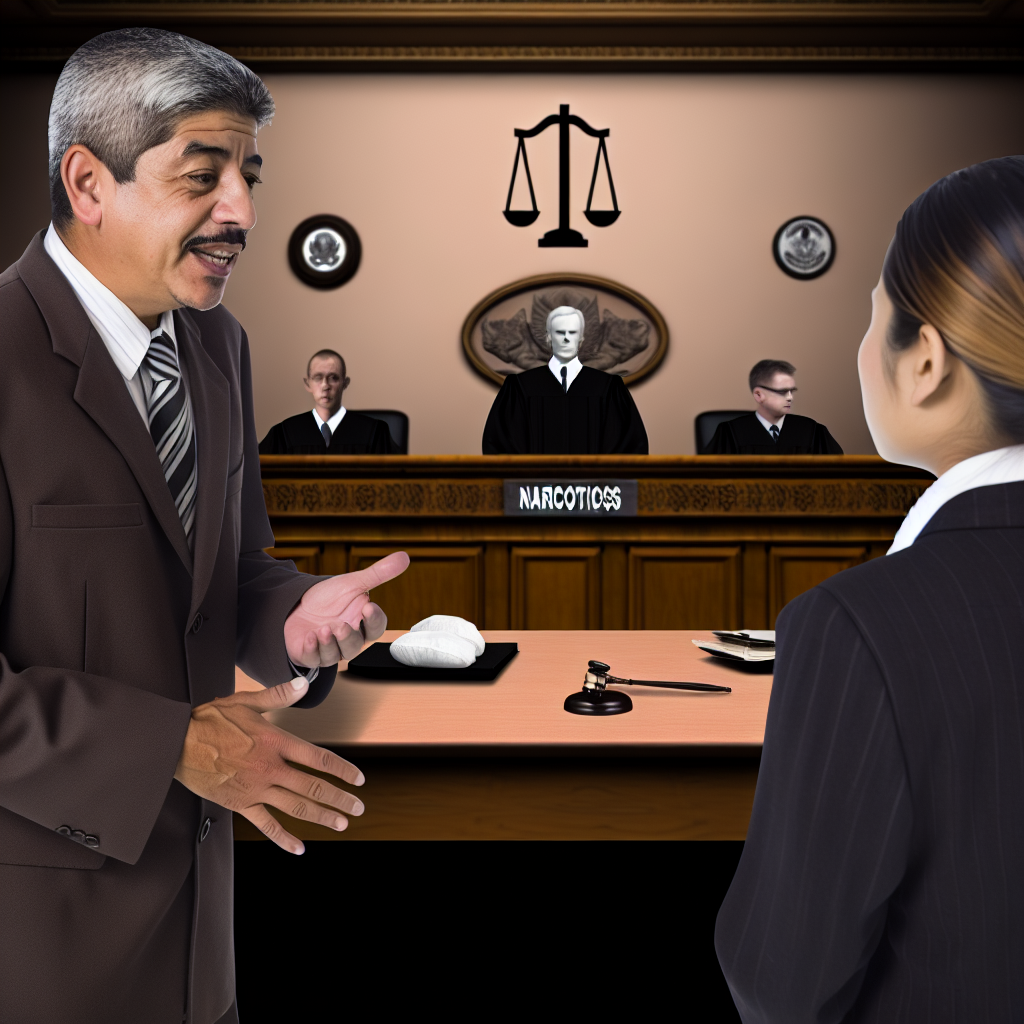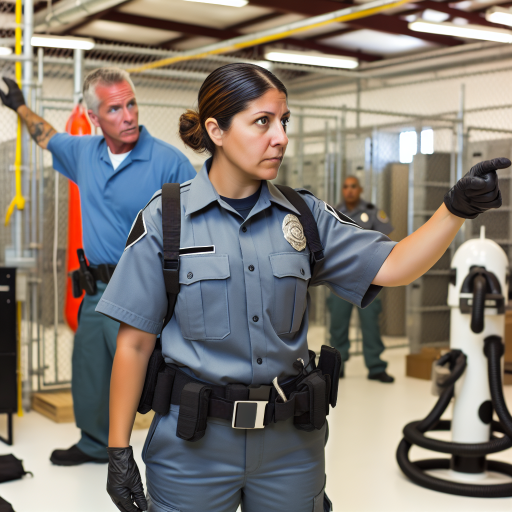Role of DEA Agents in Legal Processes
DEA agents play a crucial role in the realm of legal processes.
They are tasked with enforcing drug laws and regulations.
Their involvement ensures compliance with laws related to controlled substances.
DEA agents conduct investigations, gather evidence, and make arrests.
They work closely with other law enforcement agencies to combat drug trafficking.
Their efforts help in reducing drug abuse and trafficking activities.
DEA agents also handle cases involving international drug trafficking networks.
Their work requires meticulous attention to detail and adherence to protocols.
The presence of DEA agents deters individuals from engaging in illegal drug activities.
Overall, DEA agents play a vital role in maintaining public safety and upholding the law.
Role of DEA Agents in Investigating Drug Offenses
- DEA agents responsible for investigating violations of controlled substances laws
- Process of gathering evidence and building a case against suspects
- Importance of thorough investigations in prosecuting drug offenses
DEA Agents Responsible for Investigating Violations of Controlled Substances Laws
DEA agents play a crucial role in the fight against drug offenses.
They investigate violations of controlled substances laws.
These laws govern the production, distribution, and use of various substances deemed illegal or controlled.
DEA agents are specially trained to handle cases involving illicit drug activities.
They work tirelessly to ensure that those who violate these laws are brought to justice.
Process of Gathering Evidence and Building a Case Against Suspects
One of the primary tasks of DEA agents is to gather evidence and build a strong case against suspects involved in drug offenses.
This process involves various investigative techniques such as surveillance, undercover operations, and forensic analysis.
Agents work diligently to collect credible evidence that can stand up in court.
This evidence leads to successful prosecutions.
Importance of Thorough Investigations in Prosecuting Drug Offenses
Thorough investigations conducted by DEA agents are essential in prosecuting drug offenses effectively.
Transform Your Career Today
Unlock a personalized career strategy that drives real results. Get tailored advice and a roadmap designed just for you.
Start NowBy ensuring that all angles of a case are thoroughly explored, agents can uncover critical details that may strengthen the prosecution’s case.
This attention to detail and dedication to uncovering the truth are crucial in holding offenders accountable for their actions.
Such efforts also help deter future criminal activities.
DEA agents’ involvement in drug raids and arrests
DEA agents play a crucial role in executing search warrants and conducting raids on suspected drug facilities.
These operations are carefully planned and executed to gather evidence and dismantle illegal drug operations.
DEA agents are responsible for apprehending individuals involved in drug trafficking and distribution.
Through surveillance and intelligence gathering, agents identify and apprehend suspects to disrupt drug networks.
Safety is a top priority for DEA agents during drug enforcement operations.
Agents undergo rigorous training to handle high-risk situations while minimizing harm to themselves and civilians.
DEA agents’ involvement in drug raids and arrests is essential in combating drug trafficking and distribution.
Their dedication to enforcing drug laws and ensuring public safety is commendable.
- Execution of search warrants and raids on suspected drug facilities
- Arresting individuals involved in drug trafficking and distribution
- Ensuring the safety of agents and civilians during drug enforcement operations
Gain More Insights: Impact of Border Patrol on Local Communities
Collaboration with Other Law Enforcement Agencies
- Working with local, state, and federal law enforcement agencies to combat drug crimes
- Sharing resources and information to target drug trafficking organizations
- Coordination in large-scale investigations and operations
When it comes to combating drug crimes, collaboration with other law enforcement agencies is crucial for the DEA.
By working together with local, state, and federal agencies, the DEA is able to pool resources and expertise to effectively address drug trafficking activities.
Working with Local, State, and Federal Law Enforcement Agencies
One of the key aspects of the DEA’s approach to combating drug crimes is its collaboration with various law enforcement agencies at different levels.
Local police departments, state agencies such as state police, and federal entities like the FBI all play a crucial role in addressing drug-related offenses.
Local law enforcement agencies often have a better understanding of the dynamics of drug crimes in their communities.
They are able to gather valuable intelligence and provide on-the-ground support for DEA operations.
State agencies, with their broader jurisdiction, can assist in coordinating efforts across different regions to track down drug traffickers and dismantle their operations.
At the federal level, agencies like the FBI and Homeland Security Investigations (HSI) work closely with the DEA on cases that involve multiple states or countries.
Transform Your Career Today
Unlock a personalized career strategy that drives real results. Get tailored advice and a roadmap designed just for you.
Start NowThis collaboration ensures that drug trafficking organizations are pursued across borders and brought to justice effectively.
Sharing Resources and Information to Target Drug Trafficking Organizations
The DEA works hand in hand with other law enforcement agencies to share resources and information that can help target and dismantle drug trafficking organizations.
This collaboration is essential in conducting successful investigations and disrupting the flow of illegal drugs into communities.
Information sharing among agencies allows for a more comprehensive understanding of the operations of drug trafficking organizations.
By pooling resources such as intelligence gathering capabilities, surveillance equipment, and forensic analysis expertise, law enforcement agencies can build stronger cases against criminals involved in drug trafficking.
Moreover, sharing information about trends in drug trafficking activities and emerging threats allows agencies to stay ahead of the curve and adapt their strategies to combat evolving challenges.
This collective intelligence gathering and analysis help in predicting and preventing future drug-related crimes.
Coordination in Large-Scale Investigations and Operations
Collaboration between the DEA and other law enforcement agencies is particularly critical in large-scale investigations and operations targeting major drug trafficking organizations.
These complex cases require a high level of coordination and cooperation among various agencies to ensure a successful outcome.
By working together, law enforcement agencies can pool their resources to conduct more extensive and thorough investigations.
This includes utilizing specialized task forces, joint operations, and undercover agents to gather evidence and build cases against drug traffickers.
Coordinated efforts also help in tracking the movement of illicit drugs and apprehending key individuals involved in trafficking.
In addition, coordination in large-scale operations ensures that enforcement actions are executed effectively and efficiently.
By coordinating efforts, law enforcement agencies can avoid duplication of work, streamline operations, and maximize the impact of their interventions in disrupting drug trafficking networks.
Discover More: The Role of Private Investigators in Civil Cases
Prosecution and Testimony in Court
DEA agents are often called to testify in court cases related to drug offenses.
They provide expert testimony on drug laws, regulations, and enforcement practices.
DEA agents support prosecutors in securing convictions against drug offenders.
When it comes to prosecuting drug-related offenses, DEA agents play a crucial role in the legal process.
These highly trained professionals are called upon to provide testimony in court cases, shedding light on the intricacies of drug laws, regulations, and enforcement practices.
Transform Your Career Today
Unlock a personalized career strategy that drives real results. Get tailored advice and a roadmap designed just for you.
Start NowOne of the primary responsibilities of DEA agents in court is to serve as expert witnesses.
They are expected to provide insightful and detailed testimony on various aspects of drug offenses, including the specific laws and regulations that govern these crimes.
Their expertise in this field helps judges and juries to better understand the complexities of drug-related cases.
In addition to providing expert testimony, DEA agents also work closely with prosecutors to secure convictions against drug offenders.
By sharing their knowledge and expertise, they enhance the prosecution’s case and increase the likelihood of a successful outcome in court.
DEA agents bring a unique perspective to these cases, drawing from their first-hand experiences in investigating and combatting drug-related crimes.
The testimony provided by DEA agents in court is often crucial in securing convictions against drug offenders.
Their in-depth knowledge of drug laws, enforcement practices, and criminal behavior is invaluable to prosecutors seeking to build a strong case.
DEA agents are well-respected within the legal community for their expertise and credibility, making them highly sought-after witnesses in drug-related trials.
Ultimately, DEA agents play a vital role in the prosecution of drug offenses and the pursuit of justice in the legal system.
Their expertise and testimony help to ensure that drug offenders are held accountable for their actions and that justice is served in cases involving drug crimes.
Delve into the Subject: A Day in the Life of a Crime Scene Investigator
Involvement in Undercover Operations
- DEA agents sometimes go undercover to gather intelligence on drug trafficking activities.
- Infiltrating drug organizations to gather evidence and make arrests.
- Risks and challenges of undercover work in drug enforcement.
Gathering Intelligence on Drug Trafficking Activities
One of the key roles of DEA agents is to gather intelligence on drug trafficking activities.
This often involves going undercover to infiltrate drug organizations and gather crucial information that can lead to arrests and dismantling of criminal operations.
DEA agents may pose as drug buyers, sellers, or associates to gain the trust of criminals and gather evidence that can be used in court.
Infiltrating Drug Organizations
Undercover operations require DEA agents to immerse themselves in the criminal world.
Gaining the trust of dangerous individuals is essential to gather evidence and make arrests.
This often involves taking on new identities, establishing relationships with criminals, and participating in illegal activities to maintain cover.
DEA agents must navigate complex social networks, monitor suspicious behavior, and gather actionable intelligence without blowing their cover.
Risks and Challenges of Undercover Work
Working undercover as a DEA agent comes with significant risks and challenges.
Transform Your Career Today
Unlock a personalized career strategy that drives real results. Get tailored advice and a roadmap designed just for you.
Start NowAgents are exposed to dangerous situations, including violence, threats, and intimidation from criminal elements.
Agents must constantly assess risks, make split-second decisions, and balance the need for gathering evidence with ensuring their safety.
The psychological toll of living a double life, constantly lying, and pretending to be someone else can also take a toll on agents’ mental health.
DEA agents play a crucial role in disrupting drug trafficking operations through their involvement in undercover operations.
By gathering intelligence, infiltrating drug organizations, and navigating the risks and challenges of undercover work, DEA agents are able to make significant strides in combatting drug trafficking and protecting communities from the harms of illegal drugs.
You Might Also Like: Correctional Officer Safety Protocols

Asset forfeiture and seizure of drug-related assets
DEA agents play a crucial role in seizing assets acquired through drug trafficking.
They work diligently to track down assets that have been obtained through illegal drug activities.
Once the assets are identified, DEA agents work with law enforcement to initiate the seizure process.
Asset forfeiture is the legal process of confiscating assets that are connected to criminal activities.
- After assets are seized, a legal process begins to determine if they are linked to drug trafficking.
- The government must provide evidence to show that the assets were acquired through illegal means.
- Legal proceedings follow to allow the government to confiscate these profits for public use.
- These legal proceedings involve court hearings to determine the legitimacy of the asset forfeiture.
Deterrent effect of asset forfeiture on drug criminals
- Asset forfeiture serves as a strong deterrent to individuals involved in drug trafficking.
- Criminals are aware that their ill-gotten gains could be seized by law enforcement.
- This fear of losing assets acquired through drug crimes can discourage individuals from engaging in illegal activities.
- The threat of asset forfeiture provides a powerful disincentive for drug criminals to continue their operations.
Training and Qualifications Required for DEA Agents
DEA agents must have a bachelor’s degree and relevant work experience or a combination of education and experience.
They must pass a thorough background investigation, drug test, and physical fitness test.
Candidates must also demonstrate knowledge of federal laws and regulations related to drug enforcement.
Additionally, candidates must possess strong communication skills, critical thinking abilities, and a sense of ethics.
Specialized Skills and Knowledge Required for Effective Drug Enforcement Work
DEA agents need to have a deep understanding of the drug trade, including trends, smuggling techniques, and distribution networks.
They must be adept at conducting surveillance, undercover operations, and analyzing intelligence to build strong cases.
Agents need to have knowledge of criminal investigative techniques, evidence collection, and courtroom procedures.
They must also be skilled in using advanced technology and tools to track and apprehend drug traffickers.
Ongoing Training and Professional Development for DEA Agents
DEA agents receive continuous training in areas such as firearms, defensive tactics, and drug identification.
They attend workshops, seminars, and conferences to stay updated on the latest trends and techniques in drug enforcement.
Transform Your Career Today
Unlock a personalized career strategy that drives real results. Get tailored advice and a roadmap designed just for you.
Start NowAgents also participate in role-playing exercises, simulations, and scenario-based training to enhance their skills.
Furthermore, DEA agents have access to online resources, reference materials, and certification programs to improve their expertise.
Importance of DEA Agents in Drug Enforcement
DEA agents are essential in legal processes concerning drug enforcement.
They play a crucial role in protecting public safety.
Their dedication to upholding drug laws ensures the integrity of our communities.
It also safeguards the well-being of its members.
We appreciate the relentless efforts of DEA agents in combating drug-related crimes.
They work tirelessly to ensure justice prevails.
Without their commitment and expertise, our society would be at greater risk.
We would face increased harm and lawlessness.




